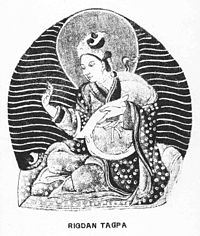This article needs additional citations for verification .(March 2024) |
| Part of a series on |
| Shambhala Buddhism |
|---|
 |
In Vajrayana Buddhism, Pawo (Wylie: dpa' bo; literally "brave guy") is translated hero or warrior. Depending on context, it can refer to the ideal of a Vajrayana practitioner; to living people (where it is sometimes used as an honorific or part of a name); to legendary or mythical figures from the past; or to purely spiritual beings.
"Pawo" translates the Sanskrit terms daka and vira, with similar meaning.
Pawos are typically described in consort with khandros, their feminine counterparts. The feminine form of the term pawo is pamo .
The tülku Nenang Pawo is often known simply as Pawo Rinpoche.
The concept of spiritual hero, or courageous fearless spiritual practitioner, plays a central role in Chögyam Trungpa's Shambhala terma, where "pawo" is translated "warrior".
| | This section needs expansion. You can help by adding to it. (April 2015) |